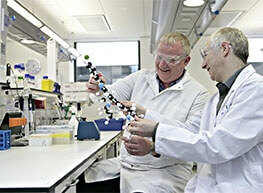Kat KelleyGHTC
Kat Kelly is a senior program assistant at GHTC who supports GHTC's communications and member engagement activities.

The Medicines for Malaria Venture (MMV)—a member of the GHTC—and the University of Dundee’s Drug Discovery Unit have developed an antimalarial compound that could treat drug-resistant cases of malaria with a single dose. The compound has been tested in both human blood and mice and the researchers involved believe it could ultimately be administered for only US$1 per dose. MMV has entered an agreement with pharmaceutical company Merck KGaA to advance the compound through the research and development (R&D) pipeline, transferring the rights to develop and commercialize any resulting product.
Researchers at the US National Institutes of Health (NIH) have developed a vaccine that has protected against leishmaniasis in monkeys. Leishmaniasis infects one million people per year and is caused by the Leishmania parasite, transmitted through the bite of phlebotomine sand flies. Scientists noted that monkeys bitten by uninfected phlebotomine sand flies were less susceptible to future infections, and subsequently determined that a protein in the flies’ saliva—known as PdSP15—triggers an immune response. Seven of ten monkeys receiving an injection of PdSP15 developed immune cells against the Leishmania parasite and were significantly less likely to get the disease than members of the control group. Human cells also reacted to PdSP15 in a laboratory setting, indicating the potential of the protein in protecting humans from leishmaniasis.
The fastest and most accurate tuberculosis (TB) test is expensive—$17,000 per machine and an additional $10 per test—and not conducive for use in rural settings because it requires electricity, refrigeration, and access to a computer. The test, known as GeneXpert is significantly more sensitive than traditional TB diagnostics, and its use increases successful diagnosis by 39 percent. Its popularity among health officials and donors has demonstrated that there is a major market for TB diagnostics, and has galvanized private-sector investments in TB R&D. There are now 191 TB diagnostics in the pipeline, and the manufacturers of GeneXpert are working to make the technology cheaper and to develop a remote, cloud-based version of the test.
Since 2010, the Pediatric Trials Network has been conducting research to determine the safety and appropriate dosage of different medicines for young children, including premature infants. Children are often excluded from clinical trials, due to issues of consent and communication, and consequently, many drugs are not tested on children before entering the market. The NIH-funded Pediatric Trials Network has gathered research from nearly 90 sites and 3,500 children across the United States, and the results have often been counterintuitive. Medical professionals often determine the appropriate dosage of a drug based on a child’s weight, however the Network’s research has indicated that underdeveloped organs, particularly in premature infants, may struggle to fully process the drugs, ultimately requiring a higher dose per pound.